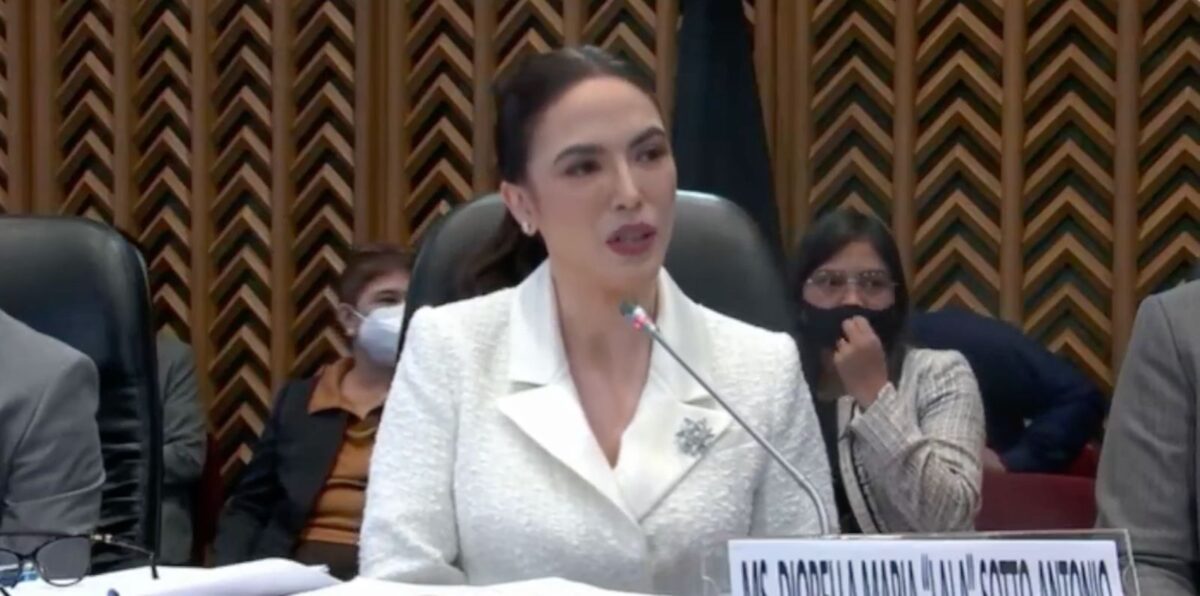MTRCB’s X rating on ‘Alipato at Muog,’ ‘Dear Satan’ an ‘overreach of mandate’ — DGPI

MTRCB chairperson Lala Sotto-Antonio faces the Senate during budget deliberations. Screengrab from YouTube / Senate of the Philippines
The Directors’ Guild of the Philippines Inc. (DGPI) said the Movie and Television Review and Classification Board’s (MTRCB) action of issuing an X rating on the films “Alipato at Muog” and “Dear Satan” reflects “an unsettling imposition of political and religious biases on creative works.”
DGPI released a statement condemning the regulatory board’s actions via the organization’s Facebook page on Monday, Sept. 9.
“DGPI unequivocally condemns the recent actions of the MTRCB in issuing an X-rating to two films, ‘Alipato at Muog’ and ‘Dear Satan.’ We believe these decisions represent an alarming overreach of the MTRCB’s mandate, reflecting an unsettling imposition of political and religious biases on creative works,” it said.
Addressing the initial X rating on “Alipato at Muog,” DGPI underscored that MTRCB’s eventual reclassification of the film to R-16 rating is a “delay in justice.”
“This film is not a work of fiction or sensationalism; it is a poignant recounting of real events, aimed at shedding light on a grave injustice that has been a matter of public record,” it continued.
“The MTRCB’s initial decision to classify this documentary as X, under the pretext of undermining government authority, is both a gross misunderstanding and an unacceptable distortion of the board’s purpose,” it added. “Although the film was eventually reclassified to R-16, this delay in justice for ‘Alipato at Muog’ reflects negatively on the subjectivity and inconsistency in the MTRCB’s decision-making processes.”
DGPI then pointed out that in the case of “Dear Satan,” MTRCB’s decision to issue an X rating is an “evident overreach.”
The organization also noted that other films with similar themes have been received positively by viewers regardless of their religious or moral implications.
“The film does not glorify evil; rather, it presents a narrative that challenges conventional depictions of antagonists, suggesting that even those considered inherently bad can change for the better,” DGPI stated.
“The MTRCB’s decision, rooted in a belief that a depiction of Satan as a character capable of good is inherently harmful, disregards the long tradition of literature and film where such themes have been explored without adverse effects,” it added.
DGPI then stressed that the regulatory board should evaluate films based on content and merit, and not “[impose] subjective moral judgments that can stifle creativity and freedom of expression.”
“The DGPI calls upon the MTRCB to adhere strictly to its mandate of providing fair and unbiased film classifications, free from personal, political, or religious prejudices,” it said.
“We urge the MTRCB to review its procedures and ensure that future ratings are based on transparent, objective criteria that respect the diversity of artistic expression,” it added.
MTRCB earlier reclassified “Alipato at Muog” with an R-16 rating following a second review by a five-member board committee. The regulatory board, however, affirmed its X rating on “Dear Satan,” saying it was violative of Presidential Decree (PD) No. 1986.